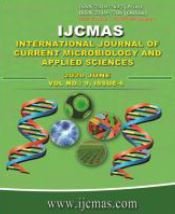


 National Academy of Agricultural Sciences (NAAS)
National Academy of Agricultural Sciences (NAAS)

|
PRINT ISSN : 2319-7692
Online ISSN : 2319-7706 Issues : 12 per year Publisher : Excellent Publishers Email : editorijcmas@gmail.com / submit@ijcmas.com Editor-in-chief: Dr.M.Prakash Index Copernicus ICV 2018: 95.39 NAAS RATING 2020: 5.38 |
With technological advances made during 21st century we are facing a global threat in form of global warming which is leading to raised average earth temperature and melting of the ice caps from Polar Regions of Earth. Methane has much more GHG effect as compared to carbon dioxide. Ruminant livestock forms a major component among anthropogenic methane leading to increased GHG effect. To overcome this situation, the most promising way to mitigate enteric methane production is either through dietary manipulation by supplementing TMR with herbal feed additives containing saponins as an active principal. Saponins are amphipathic glycosides which can produce soap like foam when shaken in aqueous solution and thus can show positive or negative effects upon microbial activity to impact fermentation, protein degradation and methane production depending upon amount of doze given. There is a need for identifying feed additives with the potential to modify rumen fermentation for enhancing the efficiency of utilization of feed energy while decreasing rumen methanogenesis. However amount of saponins to be provided so as to increase nutrient digestibility needs further investigation as there is very fine line between positive and negative effects of saponins.
 |
 |
 |
 |
 |